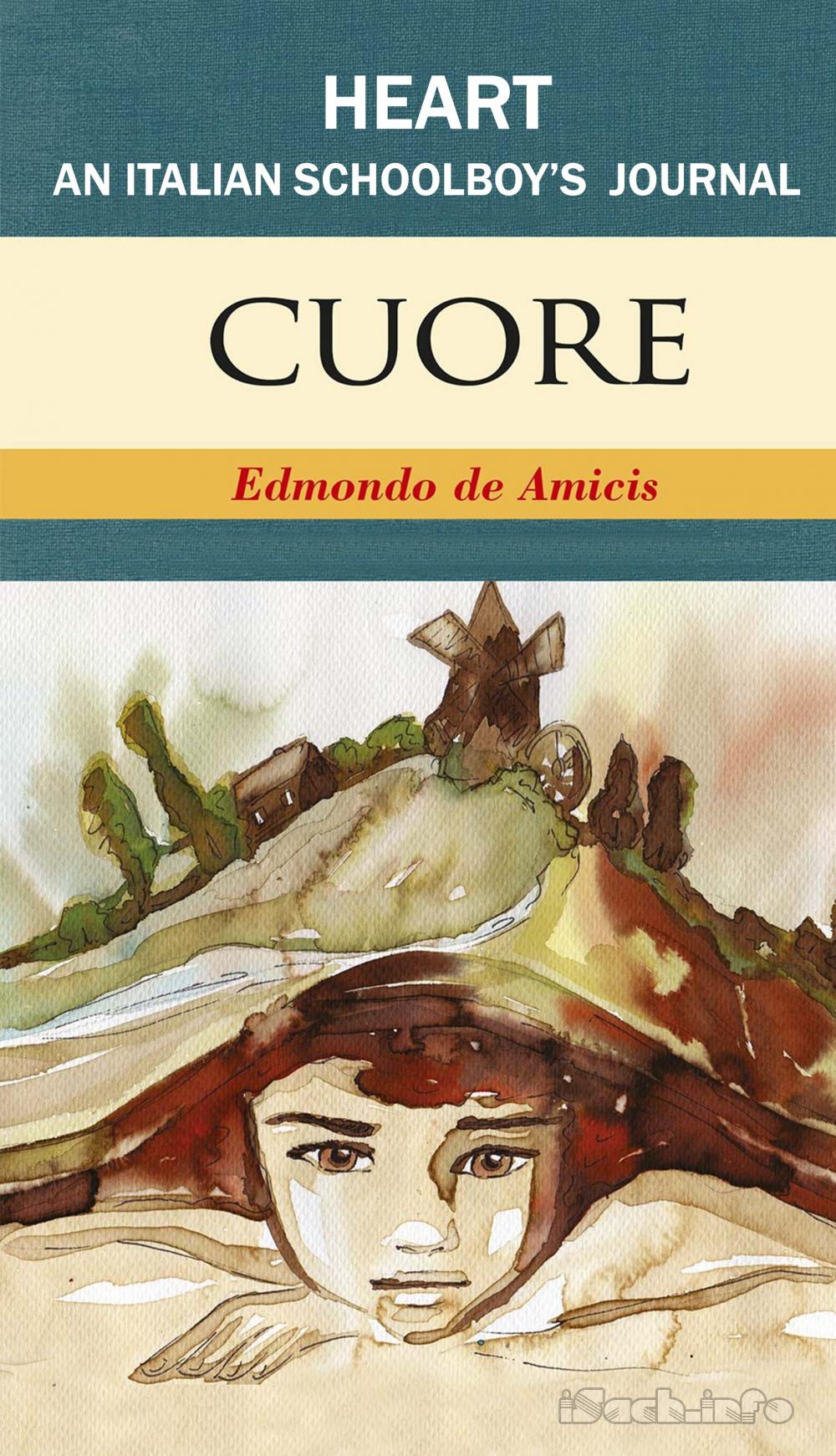Chapter 19: The Soldiers
T
uesday, 22d.His son had been a volunteer in the army when he died: this is the reason why the head-master always goes to the Corso to see the soldiers pass, when we come out of school. Yesterday a regiment of infantry was passing, and fifty boys began to dance around the band, singing and beating time with their rulers on their bags and portfolios. We were standing in a group on the sidewalk, watching them: Garrone, squeezed into his clothes, which were too tight for him, was biting at a large piece of bread; Votini, the well-dressed boy, who always wears Florence plush; Precossi, the son of the blacksmith, with his father’s jacket; and the Calabrian; and the “little mason”; and Crossi, with his red head; and Franti, with his bold face; and Robetti, too, the son of the artillery captain, the boy who saved the child from the omnibus, and who now walks on crutches. Franti burst into a derisive laugh, in the face of a soldier who was limping. But all at once he felt a man’s hand on his shoulder: he turned round; it was the head-master. “Take care,” said the master to him; “jeering at a soldier when he is in the ranks, when he can neither avenge himself nor reply, is like insulting a man who is bound: it is baseness.”
Franti disappeared. The soldiers were marching by fours, all perspiring and covered with dust, and their guns were gleaming in the sun. The head-master said:—
“You ought to feel kindly towards soldiers, boys. They are our defenders, who would go to be killed for our sakes, if a foreign army were to menace our country to-morrow. They are boys too; they are not many years older than you; and they, too, go to school; and there are poor men and gentlemen among them, just as there are among you, and they come from every part of Italy. See if you cannot recognize them by their faces; Sicilians are passing, and Sardinians, and Neapolitans, and Lombards. This is an old regiment, one of those which fought in 1848. They are not the same soldiers, but the flag is still the same. How many have already died for our country around that banner twenty years before you were born!”
“Here it is!” said Garrone. And in fact, not far off, the flag was visible, advancing, above the heads of the soldiers.
“Do one thing, my sons,” said the head-master; “make your scholar’s salute, with your hand to your brow, when the tricolor passes.”
The flag, borne by an officer, passed before us, all tattered and faded, and with the medals attached to the staff. We put our hands to our foreheads, all together. The officer looked at us with a smile, and returned our salute with his hand.
“Bravi, boys!” said someone behind us. We turned to look; it was an old man who wore in his button-hole the blue ribbon of the Crimean campaign—a pensioned officer. “Bravi!” he said; “you have done a fine deed.”
In the meantime, the band of the regiment had made a turn at the end of the Corso, surrounded by a throng of boys, and a hundred merry shouts accompanied the blasts of the trumpets, like a war-song.
“Bravi!” repeated the old officer, as he gazed upon us; “he who respects the flag when he is little will know how to defend it when he is grown up.”
Chapter 20: Nelli’s Protector
Wednesday, 23d.
Nelli, too, poor little hunchback! was looking at the soldiers yesterday, but with an air as though he were thinking, “I can never be a soldier!” He is good, and he studies; but he is so puny and wan, and he breathes with difficulty. He always wears a long apron of shining black cloth. His mother is a little blond woman who dresses in black, and always comes to get him at the end of school, so that he may not come out in the confusion with the others, and she caresses him. At first many of the boys ridiculed him, and thumped him on the back with their bags, because he is so unfortunate as to be a hunchback; but he never offered any resistance, and never said anything to his mother, in order not to give her the pain of knowing that her son was the laughing-stock of his companions: they derided him, and he held his peace and wept, with his head laid against the bench.
But one morning Garrone jumped up and said, “The first person who touches Nelli will get such a box on the ear from me that he will spin round three times!”
Franti paid no attention to him; the box on the ear was delivered: the fellow spun round three times, and from that time forth no one ever touched Nelli again. The master placed Garrone near him, on the same bench. They have become friends. Nelli has grown very fond of Garrone. As soon as he enters the schoolroom he looks to see if Garrone is there. He never goes away without saying, “Good by, Garrone,” and Garrone does the same with him.
When Nelli drops a pen or a book under the bench, Garrone stoops quickly, to prevent his stooping and tiring himself, and hands him his book or his pen, and then he helps him to put his things in his bag and to twist himself into his coat. For this Nelli loves him, and gazes at him constantly; and when the master praises Garrone he is pleased, as though he had been praised himself. Nelli must at last have told his mother all about the ridicule of the early days, and what they made him suffer; and about the comrade who defended him, and how he had grown fond of the latter; for this is what happened this morning. The master had sent me to carry to the director, half an hour before the close of school, a programme of the lesson, and I entered the office at the same moment with a small blond woman dressed in black, the mother of Nelli, who said, “Signor Director, is there in the class with my son a boy named Garrone?”
“Yes,” replied the head-master.
“Will you have the goodness to let him come here for a moment, as I have a word to say to him?”
The head-master called the beadle and sent him to the school, and after a minute Garrone appeared on the threshold, with his big, close-cropped head, in perfect amazement. No sooner did she catch sight of him than the woman flew to meet him, threw her arms on his shoulders, and kissed him a great many times on the head, saying:—
“You are Garrone, the friend of my little son, the protector of my poor child; it is you, my dear, brave boy; it is you!” Then she searched hastily in all her pockets, and in her purse, and finding nothing, she detached a chain from her neck, with a small cross, and put it on Garrone’s neck, underneath his necktie, and said to him:—
“Take it! wear it in memory of me, my dear boy; in memory of Nelli’s mother, who thanks and blesses you.”



 ePub
ePub A4
A4